Do your sales managers or call center agents hang up first? Are they always interrupting or speaking more than listening? Could conversation intelligence improve interactions with your customers? How does its importance affect sales? These and many more questions are going around these days since the merger of AI and business calls.
In today’s business world, there are existing tools for scheduling meetings, data collection, conversation analytics, personality insights, email communication, and so on.
The rise of software for conversational intelligence has paved the way for sophisticated tools to enhance sales and service performance.
The more business processes we integrate with AI, the greater the potential and revenue. AI tools have helped to earn trust, bond, have good judgment, and build better partnerships with customers. Evidently, these values are driving the overall growth of businesses through sales and other forms of call services.
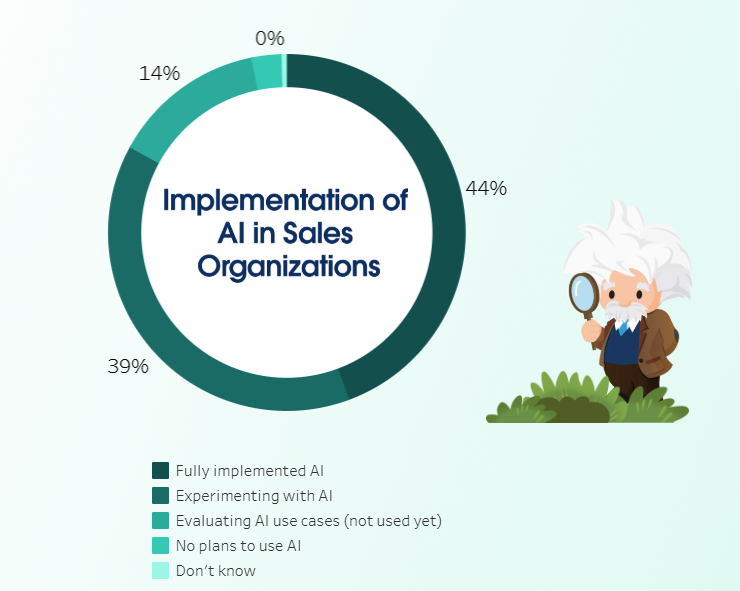
Source: Salesforce
What Is Conversation Intelligence
If you are new to the term Conversation Intelligence or CI, it is a machine learning solution that serves as a smart sales tool. This AI tool produces performance optimization by fast-tracking the process of closing deals or providing services, especially by calls.
Generally, it works efficiently for sales, customer support, and relations management communications.
The strengths of conversation intelligence software are the ability to: react to a conversation in real- time, record calls, transcribe them, enable call playback, analyze, and give a score.
How Does Conversation Intelligence Work?
In a few words, conversation intelligence software analyzes client interactions and provides live suggestions to guide conversations more effectively. These tips are passed on as feedback to the workstation of an agent or sales manager for action.
Conversation intelligence technology extracts the data from communications, scrutinizes it using machine learning & natural language processing algorithms, and feeds it back in the form of valuable insights.
In order for the AI algorithm to analyze the conversation, it’s usually first transcribed by NLP so AI can further read it, define patterns, and process it according to the preset criteria.
Average CI software has the following features:
- Сall recording, storage, and playback
- Speech recognition
- Active real-time speech-to-text transcription
- Individual and collective analysis of sales calls
- A machine learning system for in-call analytics
Learn more about The Value of Speech Recognition Solutions
Empowering Sales and Support by Conversation Intelligence Tools
Every sales manager, customer support, or relations manager should have a high aptitude to predict the direction and outcome of every conversation with customers. Normal work ethics demand that they also must be prepared with a ready response and line of action at any moment.
Speedy insights into a customer’s situation and their main points are essential. Furthermore, dealing with client’s objections, and other challenges must not be slower than conversational speed. However, all the aforementioned is unrealistic in real time for an average sales rep. This is where conversational intelligence tools come to the rescue.
The application of AI in automating and facilitating a communication process leads to better efficiency. It is evident by the time reduction in tasks like tracking email correspondence, qualifying leads, customer prospecting, or entering data.
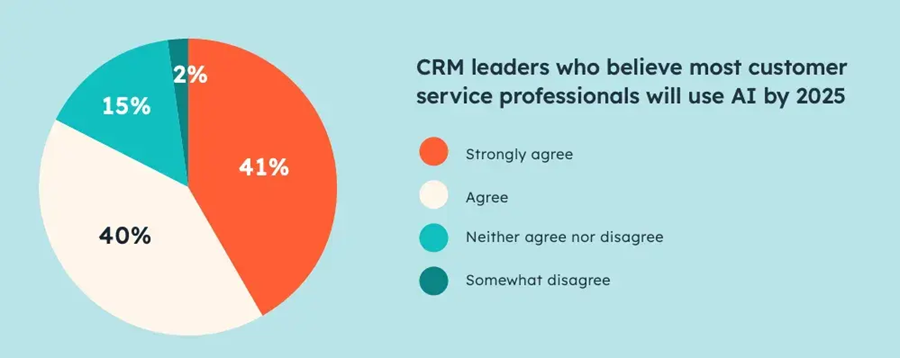
Source: HubSpot
The process of automatically transcribing calls and analyzing collected data for better service works second to none. As a matter of fact, it guides sales to successive closures by enabling sales managers to build direct relationships in the form of personalized engagement with customers.
The success of conversational intelligence is based on imitating tested conversation techniques to make operational and strategic decisions. All the data insights from a CI platform lead to facilitating business decisions, growing revenue, and satisfying customers.
At the same time, the advantages of leveraging AI-powered CI solutions complement the existing skills of a sales team and not displace them. Hence, incorporating AI in the working processes allows for the improvement of sales performance, and as we see, many companies are already adhering to it.
Learn more: Contact Center Trends – 5 Ways to Improve Customer Experience
Key Features of Conversational Intelligence
While there’s already a lot that has been said about the capabilities of conversation intelligence software software, we suggest quickly overviewing the most essential features you should look out for.
Gaining Control of Customer Engagements
What if every customer could deal with your single most effective sales or service person?
Speech-to-Text Transcription

The first and most necessary one is a real-time speech-to-text transcription that converts spoken words into accurate, readable text during conversations. This feature eliminates the need for manual note-taking and ensures that nothing falls through the cracks during the dialogue. It also provides a searchable text record that can be reviewed or shared for training and compliance purposes.
Sentiment Analysis

Then we have sentiment and emotion analysis. As the name implies, it detects the emotional tone and intent behind customer communication. But how? Well, by assessing vocal cues, word choices, and overall tone, this feature identifies whether the conversation is positive, neutral, or negative. You can guess that this intelligence can enable agents and sales reps to adjust their approach in real time right on a phone call to further foster better customer relationships.
Automated Lead Qualification

Another essential for sales team functionality that conversation intelligence software can provide is lead qualification. This feature evaluates conversational data to determine the likelihood of a prospect converting into a customer. You see, CI can analyze keywords, questions, and the customer’s level of engagement to automate lead qualification. It helps prioritize high-potential leads and save time for sales teams by filtering out less promising opportunities.
Real-Time Coaching

Imagine being on the phone with a customer and someone whispering to you the prompts. Sounds incredible? No. With real-time coaching, you can rely on live suggestions and prompts during conversations. It might recommend how to address objections, propose upselling opportunities, or highlight key points to cover. This is a tremendous help that empowers even less experienced team members to handle challenging conversations effectively and consistently.
Call Summarization

Want to save your team’s precious time and eliminate routine tasks? Call summarization allows for that by creating concise and actionable summaries of client interactions, highlighting key takeaways, decisions made, and next steps. Such conversational intelligence naturally eliminates the need for manual post-call notes and ensures critical information is accurately captured. Plus, you have all necessary data easily accessible for follow-up actions or analysis.
Performance Insights

This is where things get more interesting. A robust CI-based platform can provide you with performance insights by analyzing communication patterns and outcomes. It will help you assess individual and team effectiveness. For that, you can track a variety of metrics, such as talk-to-listen ratios, adherence to scripts, and conversion rates, that guide you in identifying strengths and areas for improvement.
Actionable Recommendations

Next, there are actionable recommendations that we’d like to mention. Thanks to AI, this valuable functionality can interpret conversation data and suggest the next best steps to take. For example, it might recommend follow-up emails, scheduling a demo, or offering a discount based on the client’s expressed needs and interests.
Customizable Dashboards and Reports

Advanced dashboards and reports are quite impressive features, too. They allow teams to visualize and analyze conversation data tailored to their specific needs. Metrics like call duration, sentiment trends, and lead conversion rates are all presented in an intuitive format. Imagine that you can access such necessary data in a convenient way and in one place! This will surely help you enhance decisions and track performance against key goals easily.
Differentiating Call Analytics from Conversation Intelligence
Call analytics platforms have been used in different industries for a while now. Therefore, there is nothing new about harvesting data to drive business performance. However, there is a difference between basic analytics and conversation intelligence.
The first one is best used for quality assurance by the executives and not necessary for onboarding, training, coaching, or improving performance directly.
On the other hand, conversational intelligence has an edge with its multipurpose, including coaching and development of agents. Collectively, CI covers intelligent script adherence, mode of operations, and other forms of compliance where agents can do better. As a result, it makes room for progressive services and coaching processes.
Below, you can find the core differences between the two:
Comparison Aspect |
Call Analytics |
Conversation Intelligence |
|---|---|---|
| Primary focus | Quantitative data analysis of calls (e.g., duration, volume, trends) | Qualitative analysis of call content and context |
| Data type | Call metadata such as time, duration, frequency, and location | Call content including speech, tone, keywords, and sentiment |
| Real-time capabilities | Typically provides insights after calls | Offers real-time feedback and guidance during calls |
| Speech-to-text transcription | Rarely included or limited in scope | A core feature with accurate, live transcription |
| Sentiment analysis | May offer basic sentiment trends based on metadata | Provides in-depth emotional tone analysis during or after calls |
| Call summarization | Often absent and requires manual input for summaries | Automatically generates summaries with key points and next steps |
| Actionable insights | Focuses on operational metrics like staffing needs or call trends | Delivers context-aware suggestions to improve outcomes |
| Complexity of insights | Basic analysis; focuses on numbers and trends | Advanced analysis; focuses on context and meaning |
| Coaching features | Generally unavailable or very limited | Offers live coaching and guidance for representatives |
| Integration with CRM | May track call volumes or durations within CRM systems | Syncs detailed interaction data, including notes and follow-up actions |
| Use cases | Optimizing operational efficiency, resource planning, and KPI tracking | Improving conversation quality, sales performance, and customer experience |
| Technology used | May use basic analytics or reporting tools | Leverages AI, natural language processing, and machine learning |
Benefits of Conversation Intelligence Software and How to Take Advantage
Now that you know the core features of CI platforms to consider, you can see how much they can do. Yet, if it’s still unclear to you what advantages the technology offers, keep reading.
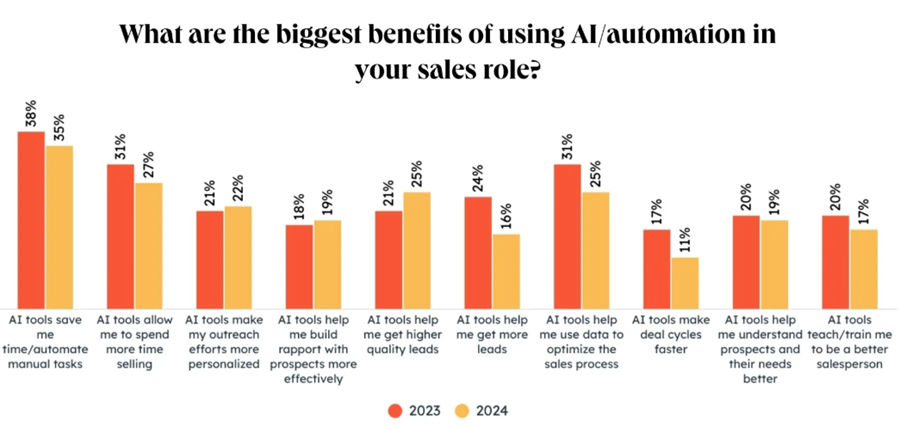
Source: HubSpot
1. The Union of CRM and Conversation Intelligence
Yes, it’s true, you rely on your CRM solution as a source of assessment for the flow of customers into the pipeline and how efficient and productive your team is. Another fact is that the CRM system has its limitations. Usually, it indicates the states of available leads but it can’t analyze why it is turning cold or not yet converted.
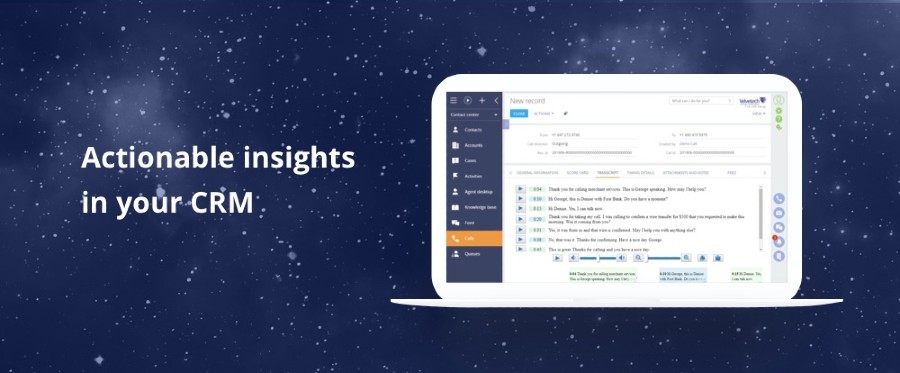
Notably, conversation intelligence tools help identifiy if the prospect is the right contact to start with. They then project the emotions of the customers, be it objections or intentions from their words. Lastly, they help sales, customer support, and relations managers to communicate value by indicating what to do next.
If CRM is the cake, a conversation intelligence tool is the icing. With a CI platform, there is no need for notes, you can skip to an exact moment of a call and listen to what was said, how it was said, and what would have been the best response or line of action.
The combination of your CRM and conversation intelligence software is technically your game-changer. Share on XIt is designed to provide insights into some of the questions below:
- Which products/services are in trend?
- What is the actual progress of a lead?
- Which competitors are most active?
- What are the best conversation techniques?
- How does the conversation of a successful sales manager differ from that of others?
- Which sales managers need coaching?
- What is the style of coaching being used by trainers, and how effective is it?
Want to empower your CRM with AI?
Our AI-Powered Call Analytics Platform, Velvetel Pulse, is a real-time intelligence tool that integrates with Creatio, Salesforce, and other CRM platforms to promote sales and services. Our solution is based on an AI and machine learning model that detects, reacts, and infers intelligent information that empowers managers or agents in their workspaces.
2. Beating the Forgetting Curve
The “forgetting curve” is a theory that came into existence by Hermann Ebbinghaus in 1885. This simple but landmark research project was the first to demonstrate that there is an exponential loss of memory unless the information is reinforced over time.
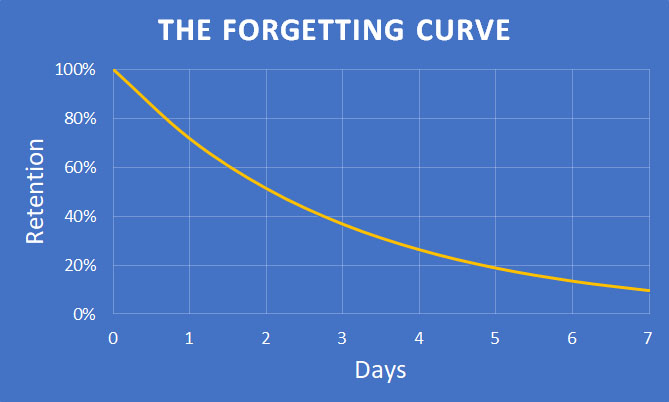
This means that after thirty-one days, learners will forget seventy-nine percent of what they learned. Consequently, it implies that the goal of increasing conversion rates by training and bringing a new employee up-to-speed may not be achieved.
However, this is not acceptable, having spent thousands of dollars on consultant speakers, organizing seminars, and training exercises to teach and coach sales managers.
The point here is not to kick against training, but how soon do the trainees fall victim to the forgetting curve? Regular people forget most of what they learn. Nonetheless, it is not a bad habit but rather a natural phenomenon.
The only way to guide against this is to increase responsibility by providing actionable insights. Therefore, conversation intelligence software will keep your sales services in top form for both individual reps and the whole team.
The learning process of your team will become express, simple, and precise. Conversation intelligence tools empower sales agents, customer support, and relations managers to:
- Identify calls with feedback requests
- See moments flagged for coaching
- Develop individually, increase job satisfaction and quota attainment
- Easily highlight, annotate, and comment on calls
- Search conversations by phrases and keywords
- Size work input against their performance with the use of a scorecard
- Navigate further to behavior change by self-identification in areas of opportunity
- Acquire a comprehensive knowledge base of the best sales practices for onboarding
Coaches and trainers also have their own piece of the pie:
- Conversation intelligence encourages peer-to-peer feedback
- It promotes training from being a regular task to a cultural thing
- The training process becomes easier and more engaging
3. Duplicate Winning Habits of Top Sales Agents
Replicating the winning practices of your best performers in the less-experienced reps is possible. For several years, it has been a challenge to closely observe hundreds of behavioral patterns and the differences that make efficient managers. If not for artificial intelligence, these winning practices would remain elusive as they can be overlooked or underestimated even in training sessions.
By using conversation intelligence technology to harvest “winning ways”, you can analyze and compare what the top sellers are doing to what the rookie managers do. As a result, the raining moments flagged in the pool of calls made daily are instrumental in transferring desired winning attributes.
As mentioned earlier, the use of conversation intelligence tools will also allow you to collect adequate materials for best practices. Additionally, these will be ready materials for references in challenging times for agents. Lastly, the training speed for sales managers will be doubled, reducing the time spent on the entire process.
4. Avoiding Relapse of Human Behavior
Imagine, for instance, that a scorecard has revealed what was lacking, the needed training has been achieved, the forgetting curve is being avoided, and you have replicated the best managers. How do you successfully transform human behaviors to remain in winning ways without relapse?
The essence of the conversation intelligence tools is identifying aspects for positive change, but the butter to the bread is a reinforcement of the change in a continuous form to yield more proceeds. In other words, while harvested data inspires change to better practices, the subconscious effort of repetition becomes reinforcement.
Conversation intelligence software makes the analysis of performance crystal clear. Furthermore, applying this technology will make your sales managers not only more accountable but also help them develop business-like behavior patterns.
It is evident that through constant intelligent tips, repeated best practice, and so on, the old inefficient ways naturally die out if combined with intentional efforts.
How Does Conversation Intelligence Software Help Businesses?
Now that we’ve covered the benefits of conversational intelligence, let’s briefly summarize the ways it can help companies streamline their sales, marketing, and service operations as well as boost the bottom line.
Clearly, this technology provides vast opportunities for businesses that adopt it and help gain competitive advantage in a number of areas. The essential impacts below outline why conversation intelligence is considered for implementation by various companies.
The list includes but not limited to:
- Saving time on lead qualification
- Optimizing sales and marketing communications
- Increasing ROI
- Enhancing customer experience
- Improving company services
Converse Better, Win More
Remember that it is not enough that you have a good sales team. They need to move beyond just talking to start having intelligent conversations. They also need to convert intelligent interactions into great service or sales because that’s the only way a company benefits.
The reality is that this has never been an easy ride until the use of conversation intelligence as software.
Gaining Control of Customer Engagements
What if every customer could deal with your single most effective sales or service person?
Velvetech’s real-time speech-to-text transcription and AI-powered call analytics platform is an accelerator for sales and business call services in many industries. These spheres include group insurance, health, finance, and others.
Learn more in this case study: AI Evolution of Insurance Sales
Velvetech will be happy to assist you in bringing your sales and service operations to a whole new level. Let’s discuss your call center challenges and see how our AI-Powered Call Analytics solutions can help. Contact us today for a demo request.











